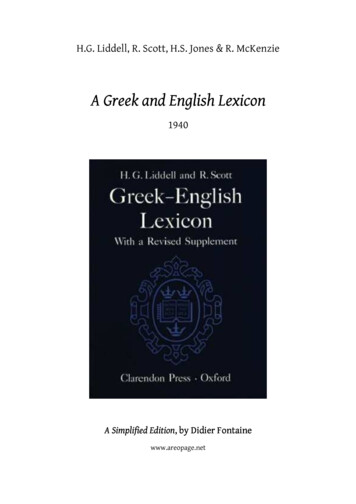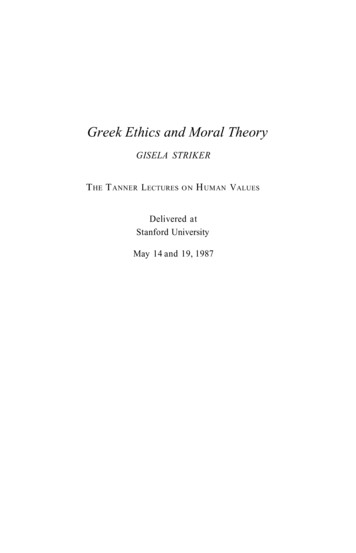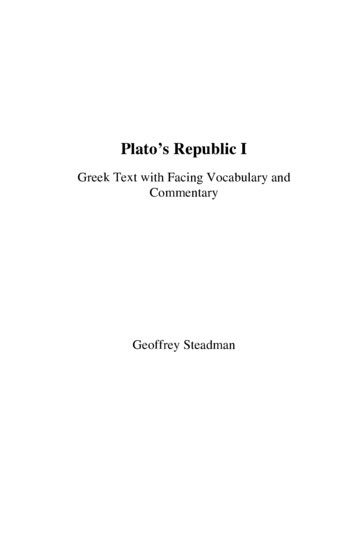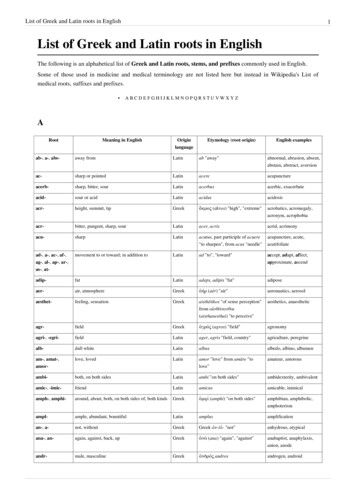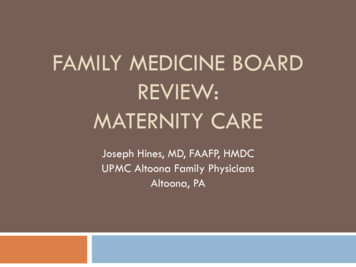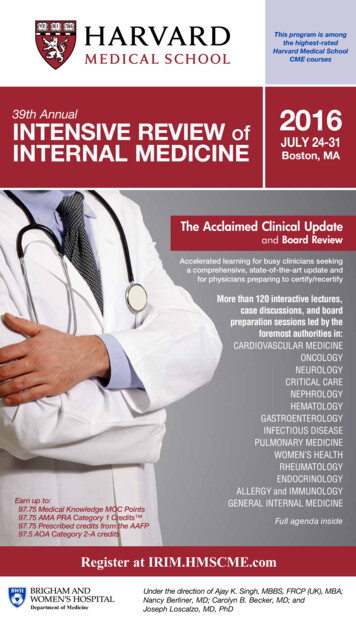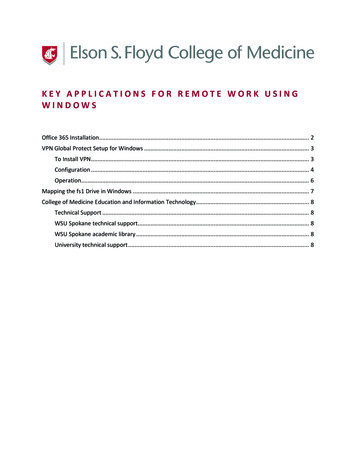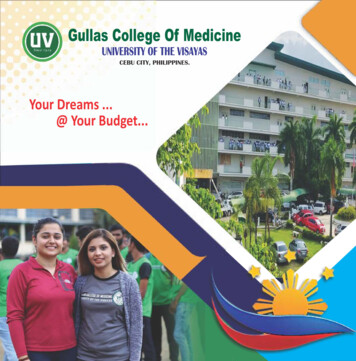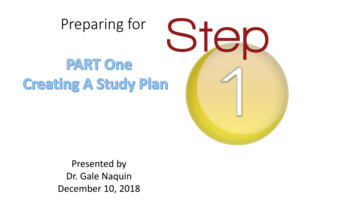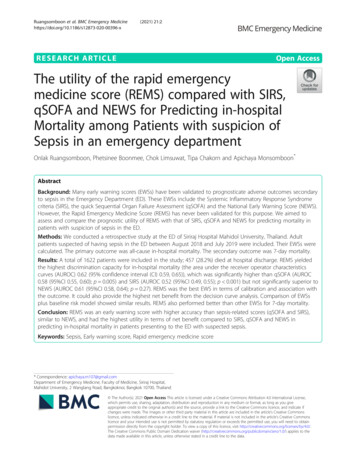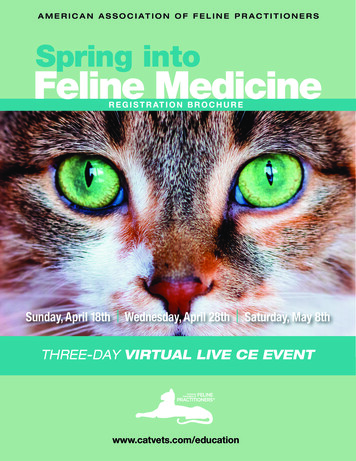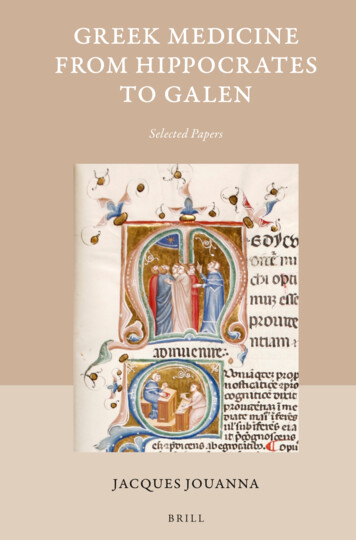
Transcription
Greek Medicine from Hippocrates to Galen
Studies inAncient MedicineEdited byJohn ScarboroughPhilip J. van der EijkAnn Ellis HansonJoseph ZieglerVOLUME 40The titles published in this series are listed at brill.nl/sam
Greek Medicinefrom Hippocrates to GalenSelected PapersByJacques JouannaTranslated byNeil AlliesEdited with a Preface byPhilip van der EijkLEIDEN BOSTON2012
This is an open access title distributed under the terms of the cc-by-nc License,which permits any non-commercial use, and distribution, provided no alterationsare made and the original author(s) and source are credited.An electronic version of this book is freely available, thanks to the support of librariesworking with Knowledge Unlatched. More information about the initiative can befound at www.knowledgeunlatched.org.Cover illustration: Miniature from the first page of Galen's Commentary on Hippocrates' Prognosticas preserved in a Latin manuscript from Naples, VIII D 25 f. 85.Library of Congress Cataloging-in-Publication DataJouanna, Jacques.[Selections. English. 2012]Greek medicine from Hippocrates to Galen : selected papers / by Jacques Jouanna ; edited with apreface by Philip van der Eijk, translated by Neil Allies.p. cm. – (Studies in ancient medicine, ISSN 0925-1421 ; v. 40)Articles originally published in French.Includes index.ISBN 978-90-04-20859-9 (hbk. : acid-free paper) – ISBN 978-90-04-23254-9 (e-book) 1. Medicine,Greek and Roman–History. 2. Medicine, Greek and Roman–Philosophy. 3. Hippocrates. 4. Galen. I.van der Eijk, Philip. II. Allies, Neil. III. Title.R138.J685 2012610.938–dc232012016074This publication has been typeset in the multilingual “Brill” typeface. With over 5,100characters covering Latin, IPA, Greek, and Cyrillic, this typeface is especially suitable foruse in the humanities. For more information, please see www.brill.nl/brill-typeface.ISSN 0925-1421ISBN 978 90 04 20859 9 (hardback)ISBN 978 90 04 23254 9 (e-book)Copyright 2012 by Koninklijke Brill NV, Leiden, The Netherlands.This work is published by Koninklijke Brill NV. Koninklijke Brill NV incorporates the imprints Brill,Brill Hes & De Graaf, Brill Nijhoff, Brill Rodopi and Hotei Publishing.Koninklijke Brill NV reserves the right to protect the publication against unauthorized use and toauthorize dissemination by means of offprints, legitimate photocopies, microform editions,reprints, translations, and secondary information sources, such as abstracting and indexingservices including databases. Requests for commercial re-use, use of parts of the publication,and/or translations must be addressed to Koninklijke Brill NV.This book is printed on acid-free paper and produced in a sustainable manner.
CONTENTSEditorial Preface . . . . . . . . . . . . . . . . . . . . . . . . . . . . . . . . . . . . . . . . . . . . . . . . . . . . . . . . viiPhilip van der EijkAcknowledgements . . . . . . . . . . . . . . . . . . . . . . . . . . . . . . . . . . . . . . . . . . . . . . . . . . . . . xiiiNote on Translations and Abbreviations . . . . . . . . . . . . . . . . . . . . . . . . . . . . . . . xviiPART ONECLASSICAL GREEK MEDICINE IN ITS HISTORICAL,LITERARY AND CULTURAL CONTEXT1. Egyptian Medicine and Greek Medicine . . . . . . . . . . . . . . . . . . . . . . . . . . .2. Politics and Medicine. The Problem of Change in Regimen inAcute Diseases and Thucydides (Book 6) . . . . . . . . . . . . . . . . . . . . . . . . . . .3. Rhetoric and Medicine in the Hippocratic Corpus.A Contribution to the History of Rhetoric in the Fifth Century . . . .4. Hippocratic Medicine and Greek Tragedy . . . . . . . . . . . . . . . . . . . . . . . . . .5. Disease As Aggression in the Hippocratic Corpus and GreekTragedy: Wild and Devouring Disease . . . . . . . . . . . . . . . . . . . . . . . . . . . . . .6. Hippocrates and the Sacred . . . . . . . . . . . . . . . . . . . . . . . . . . . . . . . . . . . . . . . .32139558197PART TWOASPECTS OF HIPPOCRATIC MEDICINE AND THEIRRELATIONSHIP TO GREEK PHILOSOPHICAL THOUGHT7. Air, Miasma and Contagion in the Time of Hippocrates and theSurvival of Miasmas in Post-Hippocratic Medicine (Rufus ofEphesus, Galen and Palladius) . . . . . . . . . . . . . . . . . . . . . . . . . . . . . . . . . . . . . 1218. Dietetics in Hippocratic Medicine: Definition, Main Problems,Discussion . . . . . . . . . . . . . . . . . . . . . . . . . . . . . . . . . . . . . . . . . . . . . . . . . . . . . . . . . . 1379. Water, Health and Disease in the Hippocratic Treatise Airs,Waters, Places . . . . . . . . . . . . . . . . . . . . . . . . . . . . . . . . . . . . . . . . . . . . . . . . . . . . . . 15510. Wine and Medicine in Ancient Greece . . . . . . . . . . . . . . . . . . . . . . . . . . . . . 17311. The Theory of Sensation, Thought and the Soul in theHippocratic Treatise Regimen: Its Connections with Empedoclesand Plato’s Timaeus . . . . . . . . . . . . . . . . . . . . . . . . . . . . . . . . . . . . . . . . . . . . . . . . 19512. At the Roots of Melancholy: Is Greek Medicine Melancholic? . . . . . 229
vicontentsPART THREETHE RECEPTION OF HIPPOCRATIC MEDICINEIN GALEN AND IN LATE ANTIQUITY13. Galen’s Reading of Hippocratic Ethics . . . . . . . . . . . . . . . . . . . . . . . . . . . . . 26114. Galen’s Concept of Nature. . . . . . . . . . . . . . . . . . . . . . . . . . . . . . . . . . . . . . . . . . 28715. Galen’s Reading of the Hippocratic Treatise The Nature of Man:The Foundations of Hippocratism in Galen . . . . . . . . . . . . . . . . . . . . . . . . 31316. The Legacy of the Hippocratic Treatise The Nature of Man: TheTheory of the Four Humours . . . . . . . . . . . . . . . . . . . . . . . . . . . . . . . . . . . . . . . 335General Index. . . . . . . . . . . . . . . . . . . . . . . . . . . . . . . . . . . . . . . . . . . . . . . . . . . . . . . . . . . 361Index of Passages Cited . . . . . . . . . . . . . . . . . . . . . . . . . . . . . . . . . . . . . . . . . . . . . . . . . 385
EDITORIAL PREFACEPhilip van der EijkThe purpose of this volume is to make available for the first time in Englishtranslation a selection of Jacques Jouanna’s papers on medicine in theGraeco-Roman world. Following the enthusiastic reception of Hippocrates(1999),1 the English translation of his 1992 monograph Hippocrate, this project hardly needs justification. Interest in ancient medicine has continuedto grow, especially in the anglophone world,2 where the subject appearsfrequently in undergraduate courses and graduate programmes at Britishand North American Universities. The annual conferences Approaches toAncient Medicine in the UK, the panel of the Society for Ancient Medicine atthe annual meeting of American Philological Association and the regularpresence of ancient medicine and related topics in panel sessions at theannual general meeting of the Classical Association in the UK further testifyto the expansion of studies in ancient medicine in the English speakingworld. Moreover, ancient medicine continues to command broad appealamong members of the medical profession and in wider social and culturaldiscourse on issues such as health and disability, life style and quality of life,happiness and flourishing, medical ethics, the body and gender.The need for greater and easier access to the sources of information aboutGraeco-Roman medicine has risen accordingly, for the linguistic skills toread the relevant texts in the original have become ever more rare. Substantial progress has been made over the past decades in meeting that need asfar as the primary sources are concerned: most of the Greek medical writingsattributed to Hippocrates are nowadays available in modern translations,31J. Jouanna, Hippocrates, transl. by M.B. DeBevoise (Baltimore 1999).For surveys of recent developments within the subject see G.E.R. Lloyd, ‘The transformations of ancient medicine’, Bulletin of the History of Medicine, 66 (1992), 114–132; V. Nutton, ‘Ancient medicine: Asclepius transformed’, in C. Tuplin and T. Rihll (eds.), Science andMathematics in Ancient Greek Culture (Oxford, 2002), 242–255; V. Nutton, ‘Ancient medicine,from Berlin to Baltimore’, in F. Huisman and J.H. Warner (eds), Locating Medical History(Baltimore, 2004), 115–138; P.J. van der Eijk, Medicine and Philosophy in Classical Antiquity(Cambridge 2005), 1–8; P.J. van der Eijk, ‘Medicine and health in the Graeco-Roman world’,in M.A. Jackson (ed.), The Oxford Handbook for the History of Medicine (Oxford 2011) 21–39.3 The Loeb Classical Library currently boasts 9 volumes of works of Hippocrates; in addition, most current editions with commentaries contain translations in a modern language.2
viiiphilip van der eijka new series of English translations of Galen is under way,4 and there are anumber of source books on Greek and Roman medicine and science thatpresent selections of primary texts in translation under thematic rubrics.5Yet as far as accessing secondary literature is concerned, there is stilla long way to go. Scholarship on Greek and Roman medicine has a longand venerable history, much of which is still relevant today, and much ofwhich is in languages other than English. The academic study of ancientmedicine was, for a long time, a predominantly French, German, Italian and,more recently, Spanish business, and although publications in English wereby no means absent, it is indisputable that the majority of contributionscame from Continental Europe. While no serious scholar of Graeco-Romanmedicine can afford to ignore this, the reality is that many students in theEnglish speaking world, including a new generation of researchers, havemore and more difficulty accessing these scholarly works in the original.Efforts are therefore needed to make scholarship on ancient medicinemore accessible. To this end, a project “Accessing Ancient Medicine” wasinitiated at the Northern Centre for the History of Medicine at NewcastleUniversity in 2009 (with Wellcome Trust support), subsequently continuedat the Humboldt-Universität zu Berlin, which aims to make available inEnglish translation a number of key texts in the history and historiographyof ancient medicine.The present publication has arisen from this project. For JacquesJouanna’s work is a powerful example of Continental scholarship that hashad an enormous impact on the study of ancient medicine over the lastforty years. In the early 1970s, Jouanna founded the Colloque InternationalHippocratique and thus created a major focus for the study of the medicalwritings transmitted under the name of Hippocrates. Since its inception inStrasburg in 1972, the Colloque has been held every three or four years andit has acted like a strong magnet for scholars in ancient medicine, providing a training ground for a younger generation of PhD students and juniorpostdocs and a venue for them to present their work. Over the years, theColloque Hippocratique has expanded in size as well as in intellectual andgeographical horizon, extending beyond the strictly philological study of4 The Cambridge Galen Translations, a series of scholarly translations of works of Galenin a unified format, in which the first volume is scheduled to appear in 2012. The LoebClassical Library has recently published a three volume translation of Galen’s Method ofMedicine.5 For example, J. Longrigg, A Sourcebook in Greek Medicine (London, 1998); G.L. IrbyMassie and P.T. Keyser, Greek Science of the Hellenistic Era. A Sourcebook (London, 2001).
editorial prefaceixtexts to embrace more contextual and socio-cultural approaches and gradually gaining ground also in the English speaking world, where it was organised first in Newcastle upon Tyne (2002) and then (after Leiden in 2005) inAustin, Texas (2008). And it is a nice irony that the publication of the presentvolume, the 40th in the Studies in Ancient Medicine, coincides with the 40thanniversary of the Colloque Hippocratique in Paris in 2012.Yet the purpose and, one hopes, the value of this volume does not justlie in its provision of English translation, or in the practical convenienceof having gathered in one volume a number of papers whose original publication was scattered over a wide range of sometimes rather specialisedvolumes. A further, and potentially even more weighty point of presentinga selection of Jacques Jouanna’s papers in the context of one collection isto highlight certain dominant strands in scholarship on ancient medicineto which he has made major, innovative contributions. This, indeed, hasbeen the most important criterion underlying the selection of the papersfor this volume, apart from considerations of interest for a wider than justphilological readership and from practical considerations of translatability.6The volume ranges from the early beginnings of Greek medicine to lateantiquity and covers more than thirty years of Jouanna’s scholarship, mostof which was conceived and developed during his Professorship at theSorbonne (1981–2004), where for many years he taught a weekly seminaron Hippocrates and where he founded and directed the CNRS ResearchGroup ‘Médecine Grecque’, and subsequently at the various conferences6 The selection of papers was made by the editor, in consultation with the author.Since the subtleties and nuances of translation of medical Greek into French can only bepartially captured by a translation into another language, a number of Jouanna’s moretext-centred, philological papers had to be excluded from consideration, although even inthe present volume this difficulty could not entirely be avoided, some papers containingdetailed observations about the semantics of Greek medical terms and expressions (not tomention the difficulties involved in trying to convey, in the English translation, the moresubtle interpretive features of Jouanna’s French translations of longer quotations from theGreek). Jouanna’s work as a philologist, editor and textual critic of Greek medical texts isbest illustrated by his editions, for the Corpus Medicorum Graecorum (Akademie Verlag,Berlin) and for the Collection des Universités de France (Les Belles Lettres, Paris), of theHippocratic works Nature of Man (Berlin, 1975; revised edition 2002), Diseases II (Paris,1983), Breaths. The Art (Paris, 1988), Ancient Medicine (Paris, 1990), Airs Waters Places (Paris,1996), Epidemics V and VII (with M.D. Grmek, Paris, 2000), Sacred Disease (Paris, 2003) andof the Galenic treatise Avoiding Distress (with V. Boudon-Millot and A. Pietrobelli, Paris,2010), by his monograph Hippocrate. Pour une archéologie de l’école de Cnide (Paris, 1974;second edition with postface, Paris, 2009), and by his contributions to the conference seriesEcdotique des Textes medicaux grecs, of which he has been one of the initiators.
xphilip van der eijkand workshops he organised at the Villa Kérylos as a member of the Académie des Inscriptions et Belles-Lettres.7 Within this wide range, three strandsare distinguished in this volume:Part One is concerned with the relationship between Greek medicine andits historical and cultural background as manifested in politics, rhetoric,tragedy and religion. Greek medicine did not develop in a vacuum, andmany of its features, both doctrinal and literary, cannot be adequatelyunderstood without consideration of their historical and cultural context.Here, two important qualifications are in order. First, ‘context’ is not necessarily confined to the Greek world but also includes other parts of theancient Mediterranean, as Jouanna shows in chapter 1, which is devotedto the relationship between Egyptian medicine and Greek medicine andto the way this relationship is represented in Greek sources. Secondly, therelationship of Greek medicine to its historical context was not a one wayprocess in which medicine was only on the receiving end. On the contrary, medicine itself has been a significant, formative player in the development of Greek culture, literature and thought. This is made particularlyclear in chapter 2 for political thought, in chapter 3 for rhetoric, as indicated by its subtitle “a contribution to the history of rhetoric in the fifthcentury” and in chapter 4 for Greek tragedy.8 Another example is religion,discussed in chapter 6, where Jouanna stresses the compatibility of therationalism of Greek medicine with the continuation of traditional religiousbeliefs—a compatibility that is nowadays taken for granted in scholarshipbut which, at the time the paper was first published, was less commonlyaccepted.The papers gathered in Part Two are concerned with a number of salientideas that can be regarded as characteristic of what is usually referred to asHippocratic medicine, i.e. the core of ideas, concepts, principles and practices expressed and advocated in a number of 5th and 4th century bce Greekmedical writings attributed to Hippocrates.9 A leading thread here are theclose connections, in the Classical period and beyond, between Greek medical thought and the ideas of a number of Greek philosophers, most notably7 A comprehensive list of Jouanna’s publications on Greek medicine up to 2007 can befound in V. Boudon, A. Guardasole and C. Magdelaine (eds), La science médicale antique.Nouveaux regards (Paris 2007) 1–18.8 Jouanna has also published widely on Greek tragedy, most notably his monographSophocle (Paris 2007).9 The question of the composition and doctrinal unity of the so-called ‘HippocraticCorpus’ is discussed by Jouanna on several occasions in the present volume; see p. 55, 74 n. 30,97.
editorial prefacexiPlato, Aristotle and Empedocles. In the present volume, these connectionsare made particularly clear in Jouanna’s study of Hippocratic ideas about thetransmission of disease (air, miasma and contagion, chapter 7), in conceptsof health and its maintenance through dietetics (chapters 8, 9, 10), in theories of cognition and sensation (chapter 11) and in models of psychosomaticinteraction (chapter 12). In these latter two chapters, a further recurrentpoint of interest in Jouanna’s work manifests itself in his study of medicalaccounts of mental health and insanity, such as the explanation of degreesof intelligence and their dietetic treatment in the Hippocratic treatise Regimen (chapter 11) and the development of the well-known, influential Greekconcept of melancholy in Hippocratic and post-Hippocratic thought (chapter 12). Here, again, Jouanna challenges widely held views (also in morepopular thought) by pointing out that in the study of the history of the concept of melancholy one needs to make careful distinctions between the ideaof melancholia as a disease, the notion of black bile as a bodily fluid andthe concept of the melancholic constitution or temperament, first in thesense of a predisposition to certain illnesses and later, in the transition oflate antiquity to the early middle ages, as the physical basis for a certainpersonality type (see also chapter 16).Part Three studies the reception of Hippocratic medicine, especiallymedical ethics (chapter 13) and the theory of the four humours, in Galenand in late antiquity. Here, Jouanna’s analysis ties in with other recent workon Galen’s Hippocratism that stresses the transformations and adaptationsthat Galen applied to the traditional picture of Hippocrates as this had beenhanded down by earlier generations. Galen had a strong personal agenda,and this colours his representation of Hippocrates and of his own relationship to Hippocrates, even if some of his ideas, such as his concept of nature(chapter 14), owe more to other thinkers, most notably Aristotle, than to theFather of medicine from Cos. A Leitmotiv within this section is Jouanna’slong standing interest in the Hippocratic work The Nature of Man, a treatise that according to some (including, most prominently, Galen) representsthe core features of Hippocratic teaching, such as the theory of the fourhumours. Yet as Jouanna shows in chapters 14, 15 and 16, this treatise hada long, varied and, at times, troubled aftermath, and later authors wentfar beyond t
Galen’s Reading of the Hippocratic Treatise The Nature of Man: . tion, most current editions with commentaries contain translations in a modern language. . the reality is that many students in the English speaki
